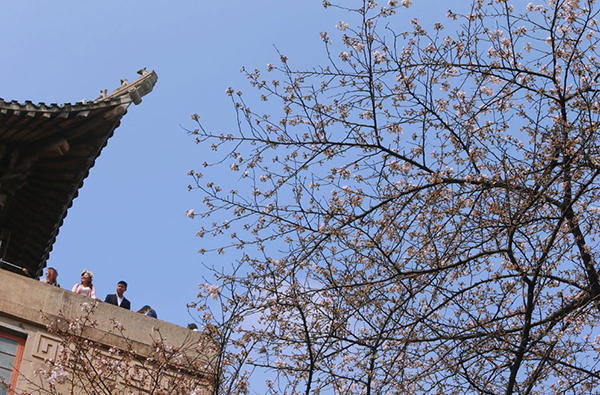Firm wants a bite of the cherry and blossom
Updated: 2016-03-24 07:53
By Zhou Yongsheng(China Daily)
|
||||||||
 |
|
People flock to see the cherry blossoms at Wuhan University, March 16, 2015. [Photo by Yuan Zheng/asianewsphoto] |
An enterprise in Wuhan, Central China's Hubei province, recently ran an outdoor advertisement in Tokyo, claiming Wuhan is home to cherry blossom. The ad also invited Tokyo residents to visit Wuhan University, where cherry blossom attracts a considerable number of tourists from across China, even abroad, in spring every year.
The ad, as a historian at Wuhan University said, has several mistakes, especially those on the origin of cherry blossom and the cherry trees in Wuhan. Despite its famous cherry-themed scenic spots, Wuhan did get most of its cherry trees from Japan after 1938, when Japanese soldiers invaded the city and sowed cherry seeds during the occupation.
In other words, the cherry blossom in Wuhan does have a genetic connection with the trees planted by the imperial Japanese army more than seven decades ago. That, to some extent, serves as a reminder of the shameful past, when many Chinese people fell prey to the brutality of the Japanese colonialists.
Through trials and tribulations, China, along with its anti-Fascist allies during World War II, managed to claim victory in the war against Japan in 1945. But some Japanese politicians' recent rhetoric denying the country's past and war crimes has rubbed salt in Chinese people's wounds. And they should be held responsible for the declining understanding between the people of the two countries.
But what drove the Wuhan enterprise to run the inaccurate ad is not clear. It would be a sad comment on the enterprise, however, if the entire endeavor turns out to be a mere publicity stunt to promote its image while deliberately turning a blind eye to the fact that Wuhan is not the place where cherry blossom originated.
Nonetheless, criticizing the ad as an "ignorant attempt" to make light of the War of Resistance Against Japanese Aggression (1937-45) would be too harsh an act. True, most cherry trees in Wuhan today have their origins in those planted by imperial Japanese soldiers. But that does not justify the grudge some people have against the city for using the cherry blossom season to attract tourists.
Many may see Wuhan's cherry trees as a symbol of Japanese invasion, which was brutal and criminal to say the least, but it is wrong to do so. The cherry trees are a gift of nature that draw hordes of tourists in spring.
Moreover, the stands of cherry trees the Japanese soldiers had planted in Wuhan died years ago. Most of the trees we see today were grafted into the rootstocks of the old ones by local residents after the 1970s, some of which were gifts from the then Japanese government and people. The existing trees, therefore, have nothing to do with Japanese militarism and should not incite hatred. More importantly, the cherry trees are now part of public property in Wuhan.
Thanks to globalization, most countries have intensified their political, economic and cultural exchanges, especially because their interests are intertwined. Such being said, China has to keep its past sufferings in mind, but it also needs to look to the future.
The author is a professor on Japan studies at China Foreign Affairs University.
- Cherry blossom at Japan's Ueno Park
- Cherry blossom seen at Gucun Park of Shanghai
- Cherry blossoms bathed in night light in Nanjing
- Enjoy cherry blossoms in and around Kunshan
- Scenery of blooming cherry and tea garden in Fujian
- Cherry blossoms signal arrival of spring
- Aerial views of cherry blossoms in Hunan
- Places to enjoy cherry blossoms in Wuxi
- Global health entering new era: WHO chief
- Brazil's planning minister steps aside after recordings revelation
- Vietnam, US adopt joint statement on advancing comprehensive partnership
- European border closures 'inhumane': UN refugee agency
- Japan's foreign minister calls A-bombings extremely regrettable
- Fukushima impact unprecedented for oceans: US expert

 Stars of Lijiang River: Elderly brothers with white beards
Stars of Lijiang River: Elderly brothers with white beards
 Wealthy Chinese children paying money to learn British manners
Wealthy Chinese children paying money to learn British manners
 Military-style wedding: Fighter jets, grooms in dashing uniforms
Military-style wedding: Fighter jets, grooms in dashing uniforms
 Striking photos around the world: May 16 - May 22
Striking photos around the world: May 16 - May 22
 Robots help elderly in nursing home in east China
Robots help elderly in nursing home in east China
 Hanging in the air: Chongqing holds rescue drill
Hanging in the air: Chongqing holds rescue drill
 2.1-ton tofu finishes in two hours in central China
2.1-ton tofu finishes in two hours in central China
 Six things you may not know about Grain Buds
Six things you may not know about Grain Buds
Most Viewed
Editor's Picks

|

|

|

|

|

|
Today's Top News
Liang avoids jail in shooting death
China's finance minister addresses ratings downgrade
Duke alumni visit Chinese Embassy
Marriott unlikely to top Anbang offer for Starwood: Observers
Chinese biopharma debuts on Nasdaq
What ends Jeb Bush's White House hopes
Investigation for Nicolas's campaign
Will US-ASEAN meeting be good for region?
US Weekly

|

|







